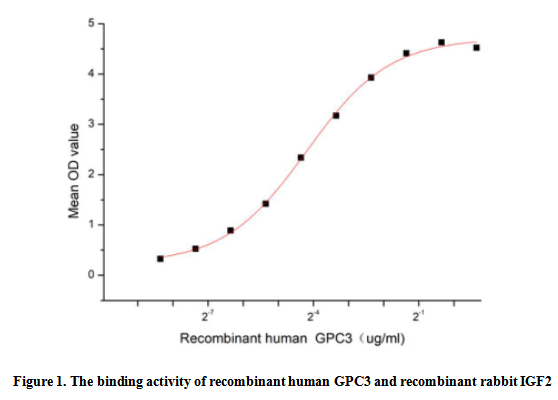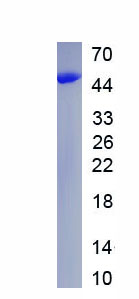Active Glypican 3 (GPC3)
DGSX; OCI5; SDYS; SGB; SGBS1; MXR7; Glypican Proteoglycan 3; GTR2-2; Intestinal protein OCI-5; Secreted glypican-3
- Product No.APA971Hu02
- Organism SpeciesHomo sapiens (Human) Same name, Different species.
- Buffer FormulationPBS, pH7.4, containing 0.01% SKL, 5% Trehalose.
- Traits Freeze-dried powder
- Purity> 95%
- Isoelectric Point6.1
- ApplicationsCell culture; Activity Assays.
- DownloadInstruction Manual
- UOM 10µg50µg 200µg 1mg 5mg
- FOB
US$ 176
US$ 439
US$ 878
US$ 2634
US$ 6585
For more details, please contact local distributors!
ACTIVITY TEST

Glypican-3 (GPC3), a 70 kDa protein, is a member of the glypican family that attaches to the cell surface by a glycosylphosphatidylinositol anchor, is specifically up-regulated in hepatocellular carcinoma (HCC) although rarely or not expressed in normal liver tissues, making it a perfect diagnostic and treatment target for HCC. GPC3 is also a negative transcriptional regulator and tumor suppressor that inhibits the growth of breast, ovary, and lung cancer cells. It is reported that GPC3 can form a complex with insulin-like growth factor 2 (IGF2), and might thereby modulate IGF2 action. Thus a functional binding ELISA assay was conducted to detect the interaction of recombinant human GPC3 and recombinant rabbit IGF2. Briefly, biotin-linked GPC3 was diluted serially in PBS with 0.01% BSA (pH 7.4). Duplicate samples of 100 μl were then transferred to IGF2-coated microtiter wells and incubated for 1h at 37℃. Wells were washed with PBST 3 times and incubation with Streptavidin-HRP for 30min, then wells were aspirated and washed 5 times. With the addition of substrate solution, wells were incubated 15-25 minutes at 37℃.Finally, add 50 µL stop solution to the wells and read at 450/630 nm immediately. The binding activity of recombinant human GPC3 and recombinant rabbit IGF2 was shown in Figure 1, the EC50 for this effect is 0.055 ug/mL.
USAGE
Reconstitute in 10mM PBS (pH7.4) to a concentration of 0.1-1.0 mg/mL. Do not vortex.
STORAGE
Avoid repeated freeze/thaw cycles. Store at 2-8°C for one month. Aliquot and store at -80°C for 12 months.
STABILITY
The thermal stability is described by the loss rate. The loss rate was determined by accelerated thermal degradation test, that is, incubate the protein at 37°C for 48h, and no obvious degradation and precipitation were observed. The loss rate is less than 5% within the expiration date under appropriate storage condition.
GIVEAWAYS
INCREMENT SERVICES
-
 BCA Protein Quantification Kit
BCA Protein Quantification Kit
-
 Molecular Mass Marker for Protein
Molecular Mass Marker for Protein
-
 Monoclonal Antibody Customized Service
Monoclonal Antibody Customized Service
-
 Polyclonal Antibody Customized Service
Polyclonal Antibody Customized Service
-
 Protein Activity Test Experiment Service
Protein Activity Test Experiment Service
-
 Electrophoretic Mobility Shift Assay (EMSA) Experiment Service
Electrophoretic Mobility Shift Assay (EMSA) Experiment Service
-
 Buffer
Buffer
-
 Lentivirus Packaging Experiment Service
Lentivirus Packaging Experiment Service
-
 Adenovirus Packaging Experiment Service
Adenovirus Packaging Experiment Service
-
 Real Time PCR Experimental Service
Real Time PCR Experimental Service
-
 Spike RBD Protein (S-RBD)
Spike RBD Protein (S-RBD)
-
 Protein G
Protein G
-
 Protein A
Protein A
| Magazine | Citations |
| Nature and Science | Diagnostic Role of Serum Glypican-3 as a Tumor Marker for Hepatocellular Carcinoma Sciencepub:10043238 |
| Journal of Applied Pharmaceutical Science | Cytotoxic effects of antiglypican-3 against HepG2 cell line Ebscohost: Source |
| Asian Pacific Journal of Cancer Prevention | Can Glypican3 be Diagnostic for Early Hepatocellular Carcinoma among Egyptian Patients? Pubmed: 24460300 |
| Clin Biochem. | Diagnostic accuracy of serum glypican-3 for hepatocellular carcinoma: A systematic review and meta-analysis Pubmed: 24362268 |
| Science and Nature | Diagnostic Role of Serum Glypican-3 as Hepatocellular Carcinoma Zolcat: Source |
| Alexandria Journal of Medicine | Role of serum glypican-3 in the diagnosis and differentiation of small hepatocellular carcinoma from hepatitis-C virus cirrhosis ScienceDirect: S2090506814000062 |
| J Egypt Natl Canc Inst. | Comparing prothrombin induced by vitamin K absence-II (PIVKA-II) with the oncofetal proteins glypican-3, Alpha feto protein and carcinoembryonic antigen in diagnosing hepatocellular carcinoma among Egyptian patients. Pubmed:24841158 |
| European Journal of Pharmacology | Evaluation of antiglypican-3 therapy as a promising target for amelioration of hepatic tissue damage in hepatocellular carcinoma Pubmed:25449037 |
| Hepatobiliary Pancreat Dis Int | Predictive value of tumor markers in patients with recurrent hepatocellular carcinoma in different vascular invasion pattern abstract:abstract4525.shtml |
| Clinical and Molecular Hepatology | Glypican-3 level assessed by the enzyme-linked immunosorbent assay is inferior to alpha-fetoprotein level for hepatocellular carcinoma diagnosis pmc:articles |
| Wiley | Glypican‐3: A promising biomarker for hepatocellular carcinoma diagnosis and treatment pubmed:28621802 |
| Biomedicine & Pharmacotherapy | Cytotoxic and partial hepatoprotective activity of sodium ascorbate against hepatocellular carcinoma through inhibition of sulfatase-2 and Pubmed:29669302 |
| Journal of Cancer and Clinical Oncology | Development and Validation of a Two-Site Immunoradiometric assay for Glypican-3 in plasma: Implication in Diagnosis of Hepatocellular Carcinoma Researchgate:Source |
| Turkish journal of oncology | Serum Glypican-3, Vascular Endothelial Growth Factor, and Interleukin-6 Levels in Hepatocellular Carcinoma 10.5505:tjo.2018.1742 |
| Intensive Care Medicine Experimental | Elevated plasma glypicans are associated with organ failure in patients with infection Pubmed: 30618011 |
| VALUE OF SERUM GLYPICAN 3 AS A PREDICTIVE TOOL FOR EARLY DIAGNOSIS OF HEPATOCELLULAR CARCINOMA (HCC) | |
| ADVANCED RESEARCHES | Search for Effective Serum Tumor Markers for Early Diagnosis of Hepatocellular Carcinoma Associated with Hepatitis C |
| Life Sci | Selenium nanoparticles overcomes sorafenib resistance in thioacetamide induced hepatocellular carcinoma in rats by modulation of mTOR, NF-κB pathways and … Pubmed:35640776 |
| Catalog No. | Related products for research use of Homo sapiens (Human) Organism species | Applications (RESEARCH USE ONLY!) |
| RPA971Hu02 | Recombinant Glypican 3 (GPC3) | Positive Control; Immunogen; SDS-PAGE; WB. |
| APA971Hu02 | Active Glypican 3 (GPC3) | Cell culture; Activity Assays. |
| RPA971Hu01 | Recombinant Glypican 3 (GPC3) | Positive Control; Immunogen; SDS-PAGE; WB. |
| APA971Hu01 | Active Glypican 3 (GPC3) | Cell culture; Activity Assays. |
| PAA971Hu01 | Polyclonal Antibody to Glypican 3 (GPC3) | IHC |
| MAA971Hu21 | Monoclonal Antibody to Glypican 3 (GPC3) | WB |
| MAA971Hu22 | Monoclonal Antibody to Glypican 3 (GPC3) | WB; IHC |
| MAA971Hu24 | Monoclonal Antibody to Glypican 3 (GPC3) | WB |
| MAA971Hu23 | Monoclonal Antibody to Glypican 3 (GPC3) | IHC |
| MAA971Hu25 | Monoclonal Antibody to Glypican 3 (GPC3) | IHC |
| FAA971Hu82 | FITC-Linked Anti-Glypican 3 (GPC3) Monoclonal Antibody | Flow cytometry. |
| SEA971Hu | ELISA Kit for Glypican 3 (GPC3) | Enzyme-linked immunosorbent assay for Antigen Detection. |
| LMA971Hu | Multiplex Assay Kit for Glypican 3 (GPC3) ,etc. by FLIA (Flow Luminescence Immunoassay) | FLIA Kit for Antigen Detection. |







